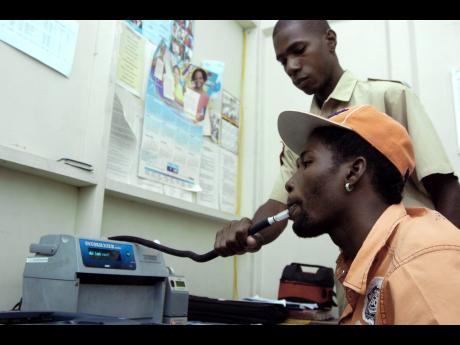Breathalyser blues - Police numbers questioned as 2017 figures show fewer than 1% of motorists tested found to be drunk
More than 22 years after Jamaica's police were first provided with breathalyser machines to detect drunk drivers as part of efforts to reduce road fatalities, there are questions being asked about the effectiveness of the system.
Only 14 of the more than 6,000 motorists who were subjected to breathalyser tests by the police last year were found to be above the allowed alcohol prescribed limits despite concerns that drunk driving could be a factor in many of the nation's road fatalities.
The Police Traffic Division has reported that it conducted at least 6,037 breathalyser tests in 2017, up from 5,051 in 2016, when fewer than 20 motorists were found driving drunk.
"It would seem low, but remember that there is a limit to the amount of alcohol you can have on your breath. So a person might have had one or two beers, but he has not passed the legal limit," said Senior Superintendent Calvin Allen, head of the Traffic Division, as he sought to explain the numbers.
Despite the seemingly low number of positive tests, Allen is calling for more breathalyser machines.
"We don't have sufficient, or else, maybe we would have far more tests being done than the 6,000," said Allen.
But Dr Lucien Jones, vice-chairman of the National Road Safety Council, was less than impressed with the number of drunk drivers reported by the cops.
"When we received that data at a meeting about three months ago, the same kind of scepticism ... was very much evident at the meeting," Jones told The Sunday Gleaner.
"We are not satisfied that we are getting the correct figures (from the police), and we just have to look at what obtains elsewhere in the world.
"We don't see why Jamaica is any different from the rest of the world. So we believe the data is false. That's the most I can tell you," added Jones.
The World Health Organisation (WHO) has suggested that about 20 per cent of fatally injured drivers in high-income countries had excess alcohol in their blood.
"In contrast, studies in low- and middle-income countries have shown that between 33 and 69 per cent of fatally injured drivers and between eight and 29 per cent of non-fatally injured drivers had consumed alcohol before their crash," the WHO reported.
The legal limit in Jamaica is 35 micrograms of alcohol in 100 millilitres of breath, or a blood-alcohol level of 80 milligrams of alcohol in 100 millimetres of blood, with breathalyser machines used to detect the levels.
FIRST IMPLEMENTED
Jamaica first implemented the breathalyser system in 1995, but it crashed after the stationary testing machines fell into disrepair when they were deemed incompatible with Jamaican climate.
Since then, the Government has introduced portable devices capable of being transported in police service vehicles.
Several high-ranking police officers have in the past praised the machines, and former Commissioner Owen Ellington, in 2011, ordered that it be a mandatory part of police spot checks and traffic crash investigations.
Allen could not say the extent to which alcohol testing was part of the investigations into the 291 fatal collisions recorded last year.
In the meantime, the traffic police said that they carried out 80,375 spot checks, stopped at least 877,986 vehicles, and searched more than one million persons last year.
They also seized some 2,500 offensive weapons from persons using the island's roadways.
Breathalyser facts
What is the legal alcohol limit?
The legal alcohol limit is 35 micrograms of alcohol in 100 millilitres of breath, or a blood-alcohol level of 80 milligrams of alcohol in 100 millilitres of blood. Control the amount of alcohol in your blood by controlling the amount of alcohol you drink. Do not drink any alcohol shortly before driving.
What is the breath test?
A breath test is the means by which the amount of alcohol in the body is determined. It is a safe and reliable method for ensuring that motorists who drink alcohol and drive do not put others' lives in danger.
When is the test done?
If police personnel have reasonable cause to believe that you are driving under the influence of alcohol, you will be asked to undergo a breath test.
How is it done?
After asking you to exit the car, the police will ask you to breathe into a hand-held instrument that will indicate whether alcohol levels in your body exceed the legal limit.
Important: The mouthpiece for the machines should be sealed. They are used once and then discarded.
If your alcohol level is above the legal limit
You will be accompanied to a police station and asked to exhale into a breath alcohol evidence machine, better known as a breathalyser. The machine will show your breath alcohol level and immediately print the results on an evidence card. This card is admissible in court. The motorist will be given a copy.

